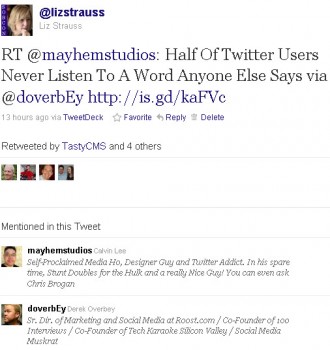
I’m a curious observer. I look, listen, connect things and identify patterns. Then I ask questions to test what it is that I think I’m finding. That’s one way that I keep learning new things about how the world works and how the people in it decide to do things.
Recently on Twitter, Calvin Lee @mayhemstudios posted an link to an article on Business Insider revealing data about Twitter users who don’t listen. Derek Overbey @doverbEy read it and retweeted it. As did I.
As you can see by the image, four people passed it on again.
What to Do About People Not Listening – on Twitter or Anywhere
Reading the data about people not listening on Twitter got me curious and turned me into an observer. As I looked, listened, connected things, and identified patterns, I asked a question to test the ideas that we’re coming together.

Asking questions gives me a chance to listen for myself. Question influence people to respond and in their response are hints and clues to how they think. The response I received fell into a pattern I’ve found predictable when I put an open ended question to the group. I’ve named the types of responses to reflect the group they represent.
- The observers retweet the question without sharing their response. Obviously, they’re listening. It would seem that they find the question interesting to pass it on. But they’re not sharing their own opinion on the thought. Maybe their objective is to spread the conversation and listen in to what other folks think. Or maybe they just want to raise their retweet count.
- The responding retweeters add a word or two to state whether they agree while retweeting the question to include the reference. They add value with their answer, offer it quickly and share with their friends it in a way that invites others to participate.
- The conversationalists add a new thought on the question.They extend the thought with an experience or an additional idea. They’ve considered the question and bring their own thinking to it to share with the group.
- The clarity checkers ask for further information about the question. They want further explanation to be sure they understand the question before they join with an opinion.
- The controversy seekers find what’s wrong in the premise of the question. Their response is not to seek further understanding or explanation, but to call out the the question itself as wrong.
- The contrarians find an answer that’s outside the scope of the question. If you ask whether they prefer fruits or vegetables, they’ll answer steak.
- The opportunist teachers see the question as their chance to show how smart they are. They start by answering with what they know on the subject, whether it answers the question or not. Then they continue for several tweets asking questions for which they already know the answers.
- The spammers find a keyword in the question or an answer to drop a highly promotional link in as if they’re commenting on the conversation. They are people who don’t follow anyone in the tweet stream. They use keyword search tools to interupt for their own spammy purposes.
- The lurkers who heard you but choose not to respond They hard to differentiate from the ignorers and the folks who just didn’t show up, but don’t make the mistake of assuming they’re the same.
and of course,
and the
It’s been said that we can’t talk without talking about ourselves. The words we choose, the metaphors we use, the choices we make of what to respond to and what to leave there all reveal things about our own view of the world and ourselves.
Paying attention to the listens on Twitter is a great way to learn how people think and respond uncovers valuable information that strict data reports cannot – valuable information to any product or marketing person, no matter the conversation or the question at hand.
What might be more important to keep in mind is that we find every one of these types of listeners in every walk of life online and off. If we listen to identify them, we soon some to realize that every kind of listener is looking for a different sort of response and a new question arises …
Some listeners seem to signal by their response that they’re better left to have the final word. What do you think on that?
–ME “Liz” Strauss
Work with Liz on your business!!
I’m a proud affiliate of

